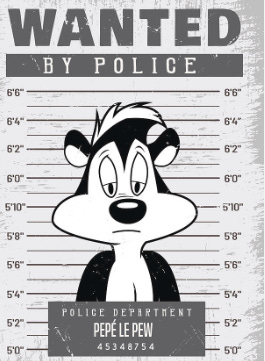Pepe Le Pew: A Legacy of Animated Charm and Controversy
The Duality of Pepe Le Pew: Endearing Character or Problematic Icon?
This week at Animated HQ, I was asked to write a guest post for the fantastic
, which was so much fun. I’ve also been researching and writing my post for this week—Pepe Le Pew—a fascinating, illuminating delve, especially from a social context.Read on for more fun details.
Introduction:
Pepe Le Pew, the charismatic skunk from Warner Bros.' Looney Tunes universe, has left an indelible mark on animation history. From his debut in the 1945 short Odour-able Kitty to his lasting influence on pop culture, Pepe has captivated audiences with his romantic escapades and unique charm.
The History:
Pepe Le Pew first graced the silver screen in the 1945 short Odour-able Kitty, directed by Chuck Jones. Created during the Golden Age of American animation, Pepe quickly became a fan favourite for his exaggerated French accent, romantic pursuits, and comedic misadventures. Throughout the following decades, Pepe starred in numerous shorts alongside other iconic Looney Tunes characters, solidifying his place in animation history.
Critical events in Pepe's history include his appearances in classic shorts such as For Scent-mental Reasons (1949), which won an Academy Award for Best Animated Short Film, and The Cat's Bah (1954). However, Pepe's character has also faced criticism for perpetuating harmful stereotypes and promoting unhealthy ideas about consent.
In recent years, Pepe Le Pew has faced renewed scrutiny amid evolving cultural sensitivities. In 2021, Warner Bros. announced that Pepe would not appear in Space Jam: A New Legacy following backlash over his behaviour. This decision reflects a broader re-evaluation of classic characters and their impact on contemporary audiences.
The Characters:
Pepe Le Pew is the quintessential romantic skunk, characterised by his suave demeanour, French accent, and distinctive odour. Despite his romantic intentions, Pepe's pursuits are often thwarted by his oblivious targets, leading to slapstick comedy and humorous misunderstandings. Other recurring characters in Pepe's adventures include reluctant love interests like Penelope Pussycat and adversaries like Claude Cat.
The Plotlines:
Pepe Le Pew's plotlines typically revolve around his relentless pursuit of love and his comical attempts to woo. Whether chasing Penelope Pussycat through Parisian streets or unwittingly courting a black cat mistaken for a skunk, Pepe's escapades are characterised by humour, irony, and absurdity. These plotlines often explore themes of mistaken identity, unrequited love, and the folly of romantic pursuits.
Spin-Offs and Related Work:
While Pepe Le Pew has primarily appeared in Looney Tunes shorts, the character has inspired spin-offs and related works in various media, including comic books, merchandise, and television and video game appearances. Pepe's cultural impact extends beyond traditional animation, influencing generations of artists, writers, and filmmakers.
Legacy:
Pepe Le Pew's legacy is complex, encompassing his enduring popularity and the controversies surrounding his character. Pepe has entertained audiences for generations as a beloved animation icon with his wit, charm, and slapstick humour. However, his portrayal of romantic pursuit has sparked discussions about consent, gender roles, and cultural stereotypes. Ultimately, Pepe's legacy serves as a reminder of the evolving nature of animation and the importance of critical engagement with beloved characters.
Fun Facts:
Pepe Le Pew was initially conceived as a one-off character, but his popularity led to numerous appearances in Looney Tunes shorts.
Pepe's distinctive odour is often depicted as visible green waves, emphasising his skunk-like qualities and adding to his visual humour.
Pepe Le Pew's catchphrase, "Le mew," is a play on the French word "le mieux," meaning "the best," reflecting his exaggerated sense of self-importance.
Conclusion:
Pepe Le Pew remains a beloved yet controversial figure in animation, with a rich history, enduring characters, and lasting legacy. While his romantic pursuits and exaggerated persona have entertained audiences for decades, they have also sparked meaningful conversations about consent and cultural representation. As the animation continues to evolve, Pepe's legacy reminds us of the power of storytelling to shape our perceptions of love, humour, and identity.
On Tuesday, I have another fantastic Animated Anecdote about CITV, which is a great read.
Thanks for reading. This post is public, so sharing is actively encouraged.







Interesting post! I don't remember this character, but I think it's fascinating how social and cultural ideas call into question previously acceptable ideas around animation.
Aw, I love this character and I love the French. Don’t want to cancel him!!